
-
 Albania to shut down TikTok in coming days
Albania to shut down TikTok in coming days
-
Pompidou museum invites public for last look before renovation

-
 Graham returns for Scotland's Six Nations match against Wales
Graham returns for Scotland's Six Nations match against Wales
-
US firm hours away from Moon landing with drill, rovers, drone
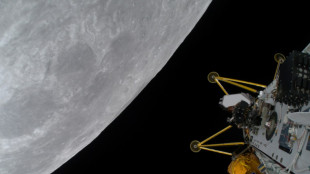
-
 Bosnian Serb leader rejects prosecutor summons as crisis deepens
Bosnian Serb leader rejects prosecutor summons as crisis deepens
-
England considering Test skipper Stokes for white-ball captaincy

-
 Neymar back for Brazil after 16-month absence for World Cup qualifiers
Neymar back for Brazil after 16-month absence for World Cup qualifiers
-
US trade gap hits new record in January as tariff fears loomed

-
 Scandinavians boycott US goods over Trump's Ukraine U-turn
Scandinavians boycott US goods over Trump's Ukraine U-turn
-
South Africa, Indonesia say US withdrawing from climate finance deal
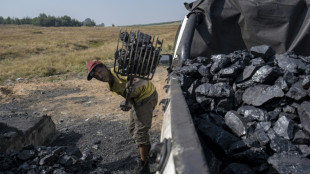
-
 ECB lowers rates again but hints more cuts in doubt
ECB lowers rates again but hints more cuts in doubt
-
Bosnian Serb leader says he is no threat to Bosnia

-
 Wales unchanged for Scotland Six Nations clash
Wales unchanged for Scotland Six Nations clash
-
World's sea ice cover hits record low in February

-
 Liverpool must be ready to 'suffer' in PSG return leg, says Van Dijk
Liverpool must be ready to 'suffer' in PSG return leg, says Van Dijk
-
Lithuania quits treaty banning cluster bombs despite outrage

-
 Philippines' Palawan approves 50-year ban on new mining permits
Philippines' Palawan approves 50-year ban on new mining permits
-
Prosecutors demand Rubiales forced kiss trial be re-run

-
 'We are not alone': Zelensky thanks Europe at crisis summit
'We are not alone': Zelensky thanks Europe at crisis summit
-
Doris delivers huge boost to Ireland for key France match

-
 European court rejects bid to overturn Romania vote annulment
European court rejects bid to overturn Romania vote annulment
-
Pope Francis resting, stable as nears three weeks in hospital

-
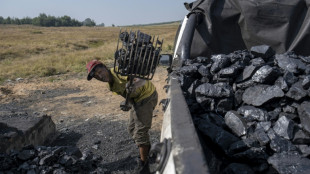 South Africa says US withdrawing from climate finance deal
South Africa says US withdrawing from climate finance deal
-
European rocket aims for first commercial launch after delays

-
 As Trump woos Russia, Kremlin shifts blame to Europe
As Trump woos Russia, Kremlin shifts blame to Europe
-
Ntamack, Alldritt start for France in Six Nations showdown against Ireland

-
 Lyon owner backs Fonseca as coach despite nine-month ban
Lyon owner backs Fonseca as coach despite nine-month ban
-
S. Korea fighter jets accidentally drop bombs, civilians among 15 injured

-
 Ukraine titanium mine hopes US deal will bring funds
Ukraine titanium mine hopes US deal will bring funds
-
Taiwan says TSMC investment 'historic moment' for US ties

-
 Ntamack, Alldritt start for France in Ireland Six Nations showdown
Ntamack, Alldritt start for France in Ireland Six Nations showdown
-
Bayern's Neuer sidelined after costly celebration

-
 DeepSeek success shows China's 'ability to innovate': official
DeepSeek success shows China's 'ability to innovate': official
-
Thailand repatriates hundreds more Chinese scam centre workers

-
 Charli XCX, Raye, Olivia Rodrigo to headline Glastonbury alongside legends
Charli XCX, Raye, Olivia Rodrigo to headline Glastonbury alongside legends
-
China vows to fight US trade war 'to the end'

-
 Hamas says Trump's 'DEAD' threat to Gaza undermines ceasefire
Hamas says Trump's 'DEAD' threat to Gaza undermines ceasefire
-
EU seeks unity on Ukraine and defence boost as Trump pivots from allies

-
 7-Eleven owner seeks to fend off takeover with buyback, US IPO
7-Eleven owner seeks to fend off takeover with buyback, US IPO
-
Zelensky urges pressure on Russia after deadly hotel strike

-
 New Zealand vow to 'find little ways' to beat India in final
New Zealand vow to 'find little ways' to beat India in final
-
Rain checks spread of Japan wildfire
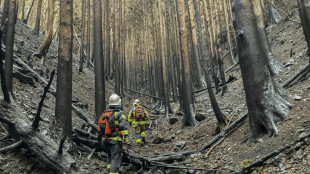
-
 Sri Lanka police seek public help to arrest chief
Sri Lanka police seek public help to arrest chief
-
Global sea ice cover hits record low in February as world continues hot streak
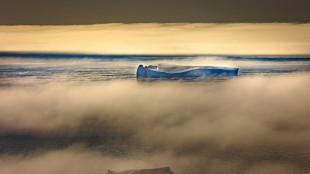
-
 Asian markets rally on US tariff reprieve, possible China stimulus
Asian markets rally on US tariff reprieve, possible China stimulus
-
Acquittal of Fukushima operator ex-bosses finalised

-
 Chinese economy faces rising international 'uncertainty', official says
Chinese economy faces rising international 'uncertainty', official says
-
Strikes hit Lufthansa profits, Olympics dent Air France

-
 Pope Francis resting after 'peaceful night': Vatican
Pope Francis resting after 'peaceful night': Vatican
-
Osaka says Indian Wells loss 'worst match in my life'

| RIO | 0.82% | 64.275 | $ | |
| CMSC | 0.04% | 23.31 | $ | |
| SCS | 0.44% | 11.48 | $ | |
| BCC | 0.2% | 100.52 | $ | |
| BCE | 1.54% | 24.08 | $ | |
| NGG | -1.58% | 59.945 | $ | |
| BTI | 0.94% | 40.055 | $ | |
| CMSD | 0.13% | 23.535 | $ | |
| RBGPF | 2.73% | 66.67 | $ | |
| RYCEF | -2.61% | 10.36 | $ | |
| JRI | -0.86% | 12.77 | $ | |
| VOD | -0.06% | 9.025 | $ | |
| RELX | -2.34% | 47.43 | $ | |
| GSK | 1.11% | 39.245 | $ | |
| BP | -0.52% | 31.715 | $ | |
| AZN | 0.04% | 77.99 | $ |

EU ministers mull climate policy, carbon border tax
European Union environment ministers gathered in France Thursday to mull climate policy and the merits of a carbon border tax, while airing differences on whether nuclear energy can be classified as "green".
The two-day informal talks in Amiens, hosted by France as it takes the rotating reins of the EU presidency, will look for a unified path toward achieving the 27-nation bloc's ambitious target of slashing carbon emissions 55 percent from 1990 levels.
Discussion on overhauling the EU's electricity market and carbon-trading system, already fraught, unfolds against a backdrop of sharp increases in energy prices, especially natural gas.
EU energy ministers will join the fray on Friday, and then continue on with separate talks.
Since last year, French President Emmanuel Macron has led the charge for the rapid implementation of a "carbon border adjustment mechanism", essentially a tax on imported products made in countries with less stringent rules on reducing carbon pollution.
The objective is to avoid shifting Europe's carbon emissions overseas as they are reduced at home -- known as "carbon leakage".
The sectors affected include steel, alumium, cement, fertiliser and electricity.
China and the United States are both opposed to such a tax, with Beijing saying last year when the plan was unveiled that it would "violate World Trade Organization (WTO) principles."
- Is nuclear 'green'? -
Even within Europe, Germany insists the mechanism can only be implemented gradually, and several countries are outright opposed, mainly because the tax would replace the allocation of free emissions permits.
"Spain, Portugal, Poland and Austria want to maintain free quotas," a European diplomat said.
Such a carbon tax "raises complicated questions," he added. "Who collects the money? Where does it go?"
But France's ecological transition minister Barbara Pompili said that there is already an "agreement in principle", and talks have shifted to questions of timing.
After EU ministers hammer out a consensus on "CBAM", as it is known, they will undertake negotiations with the EU Parliament to finalise an agreement.
Another divisive issue that has pitted Paris against Berlin is whether nuclear power's virtue as a source of carbon-free energy outweighs safety issues and the as-yet unsolved problem of nuclear waste.
A greater share of electricity in France -- about 70 percent -- is generated by nuclear power than any other country in the world.
The question on the table is whether nuclear power and natural gas should be officially classified in the "EU taxonomy" as environmentally sustainable, an important signal to companies, investors and policymakers.
Nuclear power is neither "sustainable" nor "economic", Germany environment minister Stefan Tidow said in Amiens. "It is not a green energy."
Pompili did not disagree, acknowledging that storage of spent nuclear fuel remains a major problem.
- 'Imported deforestation' -
But "nuclear is a decarbonised energy," she said. "We cannot deprive ourselves of it at the same time that we need to very rapidly reduce our carbon emissions."
A third initiative favoured by France is developing tools to fight so-called "imported deforestation," stemming from products indirectly responsible for the destruction of tropical forests.
Palm oil plantations in Southeast Asia and Africa, and commercial soy production in South America -- mostly to feed cattle -- are major drivers of deforestation.
A draft law submitted by the European Commission in November is currently under discussion in the bloc's Parliament.
Environmental NGOs said the text has too many loopholes, excluding commodities such as corn and rubber.
Yet another initiative running into stiff headwinds is a measure to expand the cap-and-trade system of carbon pollution quotas -- which currently covers heavy industry and the electricity sector -- to transport fuel for trucks and domestic heating fuel.
The controversial proposal, championed by the European Commission, has found scant support among ministers, concerned the measure would result in unpopular price hikes for consumers.
France has expressed "strong reservations," according to a French official.
"We saw the rise of the 'yellow vests'," he said, referring to popular protests in 2018 sparked by a modest increase in petrol prices.
B.Shevchenko--BTB

